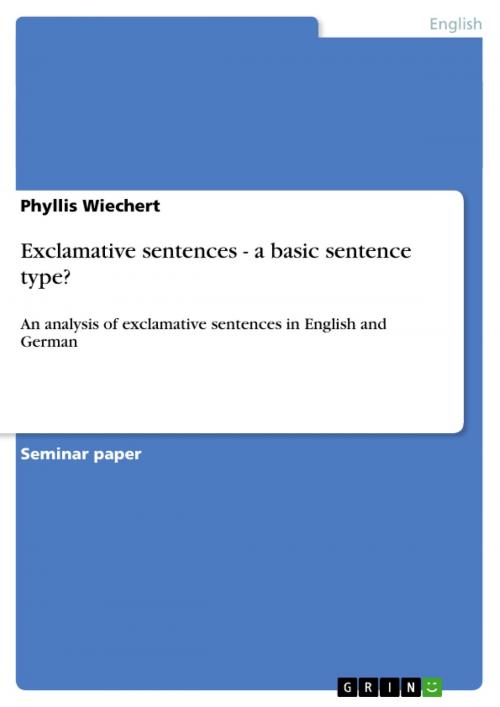Exclamative sentences - a basic sentence type?
An analysis of exclamative sentences in English and German
Nonfiction, Entertainment, Drama, Anthologies| Author: | Phyllis Wiechert | ISBN: | 9783638735988 |
| Publisher: | GRIN Publishing | Publication: | May 4, 2007 |
| Imprint: | GRIN Publishing | Language: | English |
| Author: | Phyllis Wiechert |
| ISBN: | 9783638735988 |
| Publisher: | GRIN Publishing |
| Publication: | May 4, 2007 |
| Imprint: | GRIN Publishing |
| Language: | English |
Seminar paper from the year 2004 in the subject English Language and Literature Studies - Linguistics, grade: 1,7, Free University of Berlin (Institut für Englisch Philologie), course: Understanding English - German Contrasts, 11 entries in the bibliography, language: English, abstract: The grammatical concepts for the basic sentence types in German and English are established and confirmed in various grammars. Each grammar differentiates between declarative, interrogative and imperative sentence. But when it comes to the classification of exclamative sentences different and partly excluding concepts can be found. Some grammarians regard exclamative sentences as an individual sentence type whereas others define exclamative sentences as a special case of one of the other three basic sentence types. The purpose of this paper is to try to find an answer to the controversial question whether exclamative sentences are a basic sentence type. For this reason an analysis of German and English grammars and research papers dealing with the classification of exclamative sentences is necessary. The analysis will focus on the following questions and problems: •Is there a sentence type 'exclamative sentence', which can be unambiguously characterised and identified? •If so, can exclamative sentences be regarded as a basic sentence type alongside declarative, interrogative and imperative sentences? •If not, what are exclamative sentences? Do they belong to the basic sentence types or are they a minor sentence type? The analysis will proceed in the following fashion. First, I will analyse German grammars and papers regarding exclamative sentences, including their use and meaning. Second, I will continue the analysis with English grammars and papers. A summary after each part will restate the results of the analysis. Third, in a concluding section the results will be restated shortly. The gained information from the other sections will be used to answer the initial question whether there is an individual exclamative sentence type.
Seminar paper from the year 2004 in the subject English Language and Literature Studies - Linguistics, grade: 1,7, Free University of Berlin (Institut für Englisch Philologie), course: Understanding English - German Contrasts, 11 entries in the bibliography, language: English, abstract: The grammatical concepts for the basic sentence types in German and English are established and confirmed in various grammars. Each grammar differentiates between declarative, interrogative and imperative sentence. But when it comes to the classification of exclamative sentences different and partly excluding concepts can be found. Some grammarians regard exclamative sentences as an individual sentence type whereas others define exclamative sentences as a special case of one of the other three basic sentence types. The purpose of this paper is to try to find an answer to the controversial question whether exclamative sentences are a basic sentence type. For this reason an analysis of German and English grammars and research papers dealing with the classification of exclamative sentences is necessary. The analysis will focus on the following questions and problems: •Is there a sentence type 'exclamative sentence', which can be unambiguously characterised and identified? •If so, can exclamative sentences be regarded as a basic sentence type alongside declarative, interrogative and imperative sentences? •If not, what are exclamative sentences? Do they belong to the basic sentence types or are they a minor sentence type? The analysis will proceed in the following fashion. First, I will analyse German grammars and papers regarding exclamative sentences, including their use and meaning. Second, I will continue the analysis with English grammars and papers. A summary after each part will restate the results of the analysis. Third, in a concluding section the results will be restated shortly. The gained information from the other sections will be used to answer the initial question whether there is an individual exclamative sentence type.















